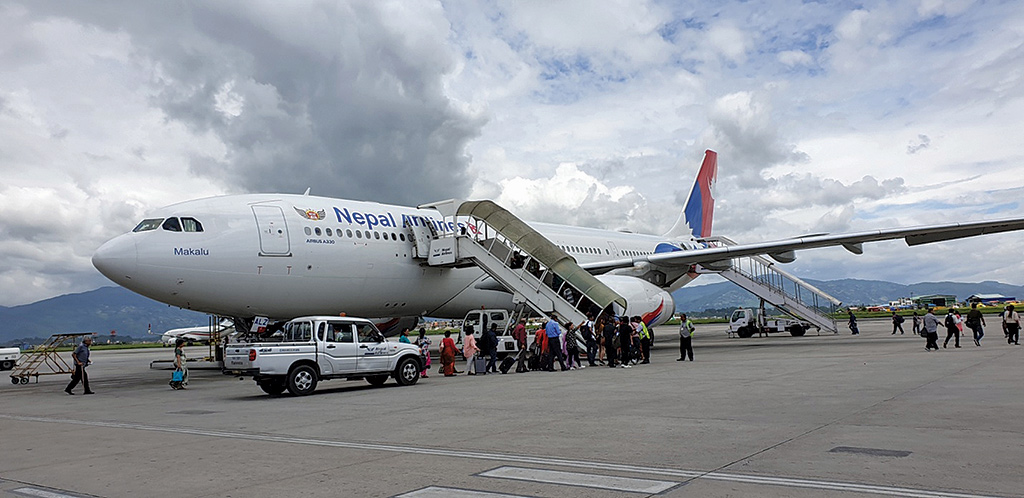
Airlines operate beyond national boundaries. This is one of the reasons the aviation sector has varying dynamics. It has already been 61 years since the first airplane – a Douglas D-3 Dakota - of the Nepal Airlines took flight in Nepal’s air-space. Since then, although a lot has changed in the aviation sector, the legal provisions of Nepal remain the same.
There are several predicaments in the aviation sector here. Nepal has been listed as the country with most air traffic activity after India in the South Asian region by International Civil Aviation Organisation (ICAO). Since the aviation sector is operating to its maximum limit, in absence of specific laws, there are several issues prevalent such as overbooking, denied boarding, flight cancellation, maintaining proper safety standards.
Overbooking
One business practice popular among airlines is overbooking. Overbooking occurs when the booking or even selling of flight tickets is beyond the seating capacity of a flight. The practice of overbooking results into bumping off passengers or denied boarding when the entire passengers show up for the flight.
Currently, there is no legislation on the topic. However, the issue of overbooking has been provided for in the Airport Facilitation Bill. The Bill provides for immediate arrangement of the next flight, arrangements for meals, refreshment and accommodation to be made and adequate compensation shall be provided to the passengers who have been denied boarding due to the reasons of overbooking. The Bill has put onus upon the airlines to manage adequate compensation, giving the airlines flexibility to decide the adequacy of compensation. It allows the airlines company to decide whether it ought to provide refreshment and accommodation or only refreshment. Although such practice is much common internationally, in the absence of specific guidelines there are possibilities of passengers or the service recipients being met out with unfair treatment.
Denied Boarding
Denied boarding has been prevalent as a matter of safety of passengers and airlines. The news of airlines denying boarding to people with nut allergies has been frequently surfacing in the news. In September 2019, Norine Khalil was denied boarding while returning from Istanbul to Canada, as she informed she had a nut allergy. As a result, she had to pay almost £1500 for new flights which is equivalent to Rs 2,24,225.
As per Nepali law, a person with unsound mind and person in custody are not to be boarded on flight. Such person can board flight if prior approval is acquired from Aviation Security Official or an officer appointed by the official with due notification to the pilot in command to arrange proper security measures. This issue was highlighted after Yagya Raj Panta, father of Nirmala Panta, was denied boarding on the ground of insanity at Dhangadi Airport. He had to drive down to Kathmandu on a 20-hour road journey while grieving for his daughter.
Such issues bring to the forefront the balancing act between the right to travel along with the safety and security of the co-passengers. More so, lack of a proper complaint mechanism in Nepal has been a major hurdle for passengers to acquire quality service.
Flight Cancellation
Airlines have the authority to cancel flight citing the reason of Air Traffic Congestion. This is a major inconvenience for passengers who have booked their tickets months in advance only to have their flight cancelled due to lack of proper air traffic management. Air traffic could easily internally be managed by the airlines by aligning their flight charts thereby protecting the passengers from major setback in their schedule. Currently, the provision of compensation solely depends on discretion of airlines. For the protection of passengers as consumers of services, specific guidelines ought to be in place for the airlines to provide such compensation, in the event of delay or cancellation.
The apex court, in a case decided in 2075 (decision no. 9989), stated that flights cannot be rescheduled by the Airlines Company unless under extraordinary situations. The court further stated that the unreasonable cancellation and delay of flights and providing information as to cancellation of flights falls under the duty of service provider to fulfill its obligations of quality service. However, the practice of flight cancellation is still, solely guided by the policy of individual airlines.
Compensation & Carriage Liability
The Montreal Convention creates liability in case of injury or death to passenger as well as delay, damage or loss of baggage or cargo. Pursuant to the Convention, the insurance coverage of every Nepali passenger flying on international flights is "up to 157,750 equivalent to Rs 20,289,307.5 approximately as of December 28, 2019." The liability arising out of the Montreal Convention is however limited to international air carriers. As it stands, it may not be economically viable for domestic airlines of Nepal to provide equivalent insurance. However certain measures, guidelines, standards ought to be enforced at the national level, to ensure the protection of the passengers.
Complaint Mechanism
As per the Montreal Convention, passengers have many options to file a complaint. They could claim damages at a court in the home country of the carrier, in the principle place of business, place where the contract was made, destination of the flight, or file a claim at a place of permanent residence, regardless of their nationality.
However, in the context of Nepal, lack of specific legislation has been an acute problem. In a recent judgment by the Supreme Court of Nepal in a case against an Airline in 2075 BS, the apex court, in the absence of certain laws addressing the conducts of passengers as well as airlines, based its decision on wider interpretation of the Consumer Protection Act. Highlighting the absence of appropriate laws, a directive order was issued to the Ministry of Culture, Tourism and Civil Aviation to make laws or standards of air service.
Given that the aviation laws have tremendous scope for reforms and that many aviation practices currently remain unregulated, the commercial airlines in Nepal and around the globe are bound to operate in vacuum at their own discretion. This can be addressed by developing and implementing guides and policies for standards and measures to promote safety, accountability and ultimate efficiency of the aviation sector.





